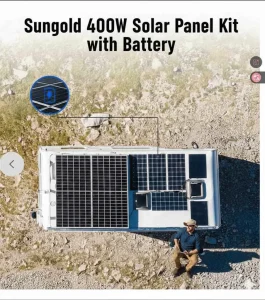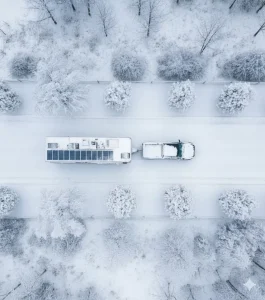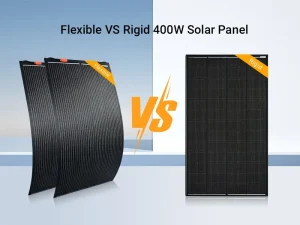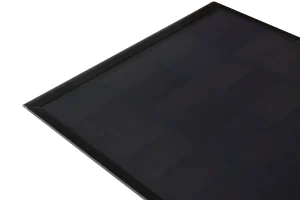As we strive to reduce our carbon footprint through eco-friendly solutions, solar panels stand out as a promising alternative. Powering a refrigerator with portable solar panels is an innovative and increasingly popular approach. Solar panels offer a green and reliable power source for your cooling needs. In this article, we will explore how much solar power you need and how solar energy can run various household appliances, including your regular refrigerator and camper van fridge.
In this guide, you’ll learn:
Whether solar panels can run a refrigerator
How many panels you need for different fridge types
What components to use in your off-grid solar setup
How Sungold’s portable panels help simplify your system
Can solar power run a fridge
Refrigerators consume a substantial amount of energy, so if you plan to use solar power, it is essential to choose the right refrigerator. When selecting a solar-powered refrigerator, there are several important factors to consider, with size being the most critical. Ensure that the refrigerator is large enough to meet your needs without being so large that it consumes unnecessary energy.
There are several advantages to using a solar-powered refrigerator over traditional models. Firstly, it is an eco-friendly solution, as it reduces reliance on fossil fuels and limits greenhouse gas emissions. Secondly, solar power can significantly reduce electricity bills by powering the appliance with renewable energy. Lastly, the autonomy provided by solar panels makes them ideal for use in areas with limited power supply, such as during camping trips or in rural locations.
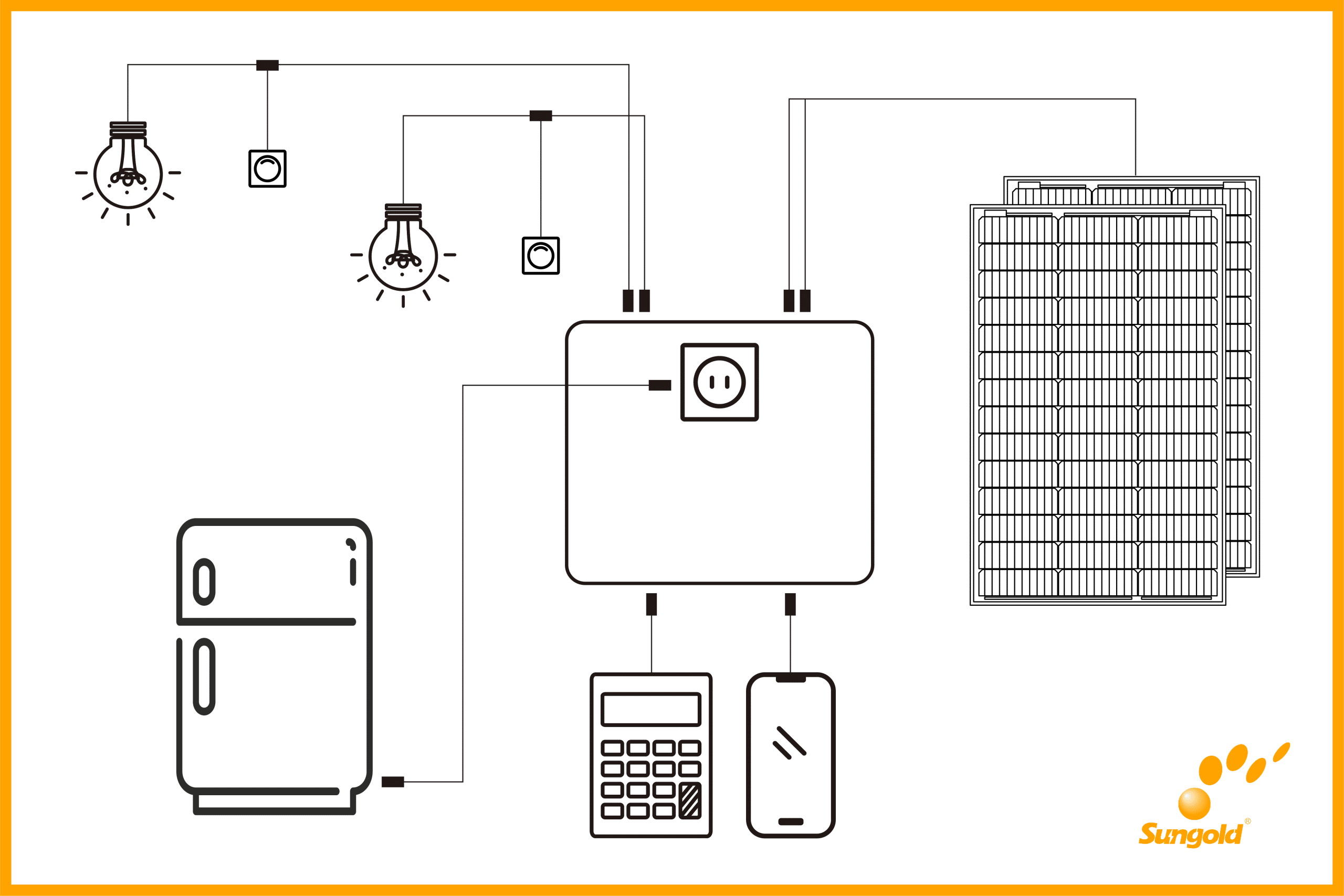
how many solar panels do i need to power a refrigerator
Solar panels are an excellent way to reduce electricity bills and protect the environment. But how many solar panels do you need to power a refrigerator? The number of solar panels required depends on the size of the refrigerator and the wattage of the solar panels. To power a refrigerator with solar panels, you must know the wattage required for its operation. This information is typically found on the appliance’s nameplate, which is located inside or on the back of the refrigerator. The wattage varies by model:
- 12V Refrigerator: between 50 and 100 watts
- Compact Refrigerator: between 150 and 300 watts
- Large Refrigerator: between 400 and 800 watts
The number depends on:
Fridge type (12V / compact / full-size)
Energy efficiency
Sunlight hours
Solar panel wattage
📊 Estimated Solar Panel Requirements
| Refrigerator Type | Avg. Power (Watts) | Suggested Panel Wattage | No. of Panels |
|---|---|---|---|
| 12V RV Fridge | 50–100 W | 200W | 1–2 panels |
| Compact Fridge | 150–300 W | 300W | 2–3 panels |
| Full-size Fridge | 400–800 W | 400W | 3–5 panels |
Assumes 4–5 peak sunlight hours/day and 80% system efficiency.
The Sungold 200 Watt 12 Volt Solar Panel is an excellent option for effective solar power generation. These panels are celebrated for their robustness and superior efficiency, making them ideal for both residential and remote applications. They are user-friendly and can be easily integrated with diverse systems. Sungold provides an assortment of wattages to meet various energy requirements, backed by strong customer service and dependable guarantees. Choosing Sungold panels ensures a secure investment, offering both functionality and environmental benefits.
Key points about the solar-powered refrigerator
Fridges run 24/7 — sizing needs to cover continuous loads
Startup power may be 2–3x higher than running wattage
Shaded panels reduce output — choose anti-shade tech when possible
For stable off-grid performance, use a combination of solar + battery.
Components Needed to Power a Refrigerator with Solar Panels
Photovoltaic Solar Panels To run a refrigerator using solar power, you must first choose the appropriate solar panels. The size and capacity of the panels will determine how much energy can be generated to power the refrigerator. Consider the following factors:
- The power required to run the refrigerator (measured in watts).
- The minimum amount of sunlight available in your area. The more sunlight you have, the more power your panels can generate.
Auxiliary Battery To ensure the refrigerator runs continuously without interruption, an auxiliary battery is needed to store the energy generated by the solar panels. This battery allows the refrigerator to operate during periods of low or no solar power production, such as at night.
Charge Controller and Inverter The charge controller manages the flow of energy between the solar panels, battery, and refrigerator, optimizing battery charging while protecting the electrical components. The controller must be compatible with the power output of both the solar panels and the battery to function properly.
The inverter, on the other hand, is a crucial device that converts the direct current (DC) produced by the solar panels into alternating current (AC), which is compatible with kitchen appliances, including the refrigerator.
how to calculate how many solar panels you need to power your refrigerator
Number of Solar Panels Required to Run a Refrigerator .The number of solar panels needed to run a refrigerator depends on the panels’ power output and the refrigerator’s power consumption. To calculate this, you need to know the refrigerator’s daily electricity demand, which is influenced by the size of the refrigerator, its energy efficiency rating, and the ambient temperature.
A rough estimate suggests that a refrigerator’s daily electricity demand ranges between 1.5 to 3 kilowatt-hours (kWh). For an average solar panel with a power output of 250 watts, you would need approximately 6 to 12 panels to meet the refrigerator’s daily power requirements.
However, it is important to note that the actual power consumption of a refrigerator can vary based on ambient temperature and usage patterns. For instance, in hot and humid conditions, the refrigerator will need to run more frequently to maintain its internal temperature, which increases power consumption.
Therefore, it is advisable to accurately calculate the power consumption and adjust the number of required solar panels accordingly.
can a 200-watt solar panels run a refrigerator
A 200W solar panel like the Sungold 200W Hi-Power can run a 12V fridge or small RV fridge with 40–80W draw, especially when paired with a 100Ah battery.
Estimated output:
200W panel × 5h/day = 1kWh/day
Enough for most RV or portable fridges
For medium or full-size home fridges, you’ll need more panels.
can a 300-watt solar panels run a refrigerator
When running a refrigerator on solar power, understanding the power and startup requirements is crucial. A refrigerator’s power consumption typically ranges from 300 to 800 watts, with startup power usually being two to three times higher. So, can a 300-watt solar panel run a refrigerator? To answer whether a Sungold 300-watt solar panel can power a refrigerator, we need to first understand what a 300-watt solar panel is and what it can do. A 300-watt solar panel is a device that converts sunlight into electrical current, which can be used to power various appliances, including refrigerators and air conditioners.
To determine if a 300-watt solar panel can run a refrigerator, consider two factors: the amount of electricity the refrigerator consumes and the amount of sunlight the solar panel receives. Most refrigerators consume about 600 watts of power, so a 300-watt solar panel cannot directly power it. However, if the refrigerator’s power consumption is lower, or if there are other appliances that consume more power, the solar panel can provide some of the required electricity.
Additionally, having a backup battery system to store excess energy generated by the solar panel can help in powering the refrigerator during periods of low sunlight or at night. This setup ensures a more reliable power supply and maximises the efficiency of your solar energy system.
Can a 400 watt Solar Panel Run a Refrigerator?
Powering a Refrigerator with Solar Panels Refrigerators consume different amounts of energy depending on their size, age, brand, and model. Newer, more efficient models use less power compared to older or larger ones. In fact, under ideal conditions, a 400W solar panel can generate enough energy to run a small, efficient refrigerator.
First, it’s important to understand how solar panels work. Solar panels consist of many small cells that convert sunlight into electricity. When sunlight hits these cells, the energy from the sun is converted into an electric current. This current is then sent through an inverter, which converts it into alternating current (AC) that can be used in your home.
One of the main factors determining how much power a solar panel can produce is its size. However, other factors also affect the efficiency of solar panels. The efficiency of a solar panel depends on the amount of power it can generate, the amount of sunlight it receives, and its angle relative to the sun. For instance, the Sungold Hi-Power 400W portable solar panel is a suitable choice for running a refrigerator, as it balances both portability and high power needs.
By understanding these factors, you can better determine how many solar panels you need and how to optimise their performance to meet your energy requirements.
What Size Solar Panel do I Need to Run a 12v Fridge
To determine the size of the solar panel needed to run a 12V refrigerator, you must first calculate the amperage used by the refrigerator. Multiply the refrigerator’s voltage by the amperage it uses; most refrigerators use around 13 amps. This will give you the wattage required by the refrigerator. Solar panels with a rating of 100W, 200W, or higher can effectively run these 12V refrigerators, which consume 40-80 watts of power.
Assume an average duty cycle of 1/3 for each refrigerator, meaning the compressor runs about 33% of the time.
The recommended solar panel size should include a buffer to address inefficiencies in the system, such as losses from the charge controller, battery, and inverter (if used). For simplicity, we assume an average system efficiency of around 80%, and five peak sunlight hours per day, which is a common average in many regions.
12V refrigerators typically consume 40-80 watts per hour, depending on their size, insulation, and efficiency. Considering the on-off cycling throughout the day, a 12V refrigerator usually uses between 320Wh and 640Wh per day. Solar panels with a rating of 100W, 200W, or higher can effectively run these 12V refrigerators.
At Sungold, we offer highly efficient portable solar panels that are perfect for 12V refrigerators, such as the 2*50W or 2*100W SPC portable charging kits.
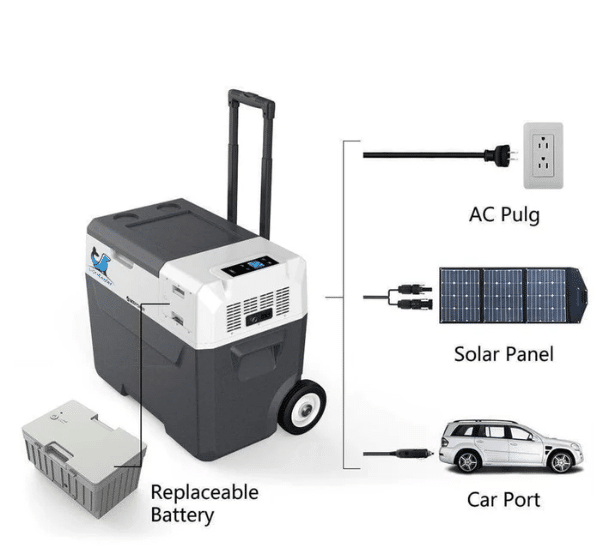
How much solar to run RV fridge
To determine how much solar power is needed to run an RV refrigerator, several factors must be considered. First is the size and efficiency of the refrigerator. Larger refrigerators require more energy to operate, while newer models are generally more energy-efficient than older ones. Another important consideration is the climate in which you will be using the refrigerator. Hotter climates will require more power because the appliance needs to work harder to maintain cool temperatures.
Once these factors are taken into account, you can estimate the number of solar panels needed. As a general rule of thumb, you can expect an RV refrigerator to require at least 100 watts of solar power per hour. This means that if you plan to use the refrigerator for an average of 8 hours a day, you will need approximately 800 watts of solar power.
RV fridges typically run on 12V and use 40–60W/hour.
Daily need: ~480–720Wh
Recommended setup:
1 × 200W panel
1 × 100Ah lithium battery
MPPT charge controller
Pure sine inverter (if fridge is AC)
Sungold’s 200W panel is a perfect match for reliable cooling in your RV.
Final thoughts
Running a fridge on solar is entirely possible and practical. By calculating your power needs and selecting the right Sungold portable solar panels and batteries, you’ll enjoy:
Independence from the grid
Energy savings over time
Reliable cooling anywhere
If you’re unsure how to size your system, feel free to reach out. Sungold offers pre-configured kits for every use case.
📩 Contact: [email protected]
Or start with our Off-Grid Solar Kit Selector » (Coming soon)
Frequently Asked Questions (FAQ)
Q1: Can one 200W solar panel run a refrigerator?
Only for small or 12V fridges. For full-size fridges, use at least 2–4 panels.
Q2: Do I need a battery to run a fridge on solar?
Yes. Without battery storage, your fridge won’t run at night or on cloudy days.
Q3: Can I run a fridge and lights on the same solar system?
Yes, just size your panels and battery to cover the total load (fridge + lights).
Q4: What’s the best solar panel type for a refrigerator?
High-efficiency portable panels like Sungold’s Hi-Power Series are ideal due to their output and compatibility with charge controllers.



